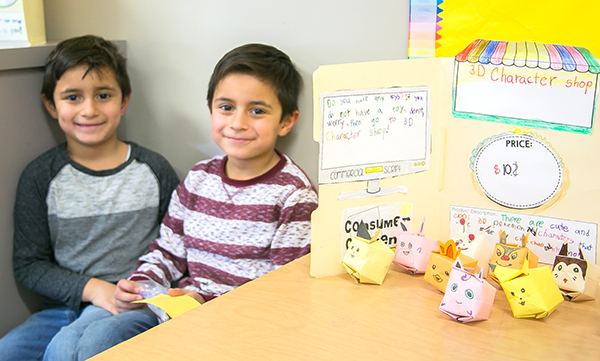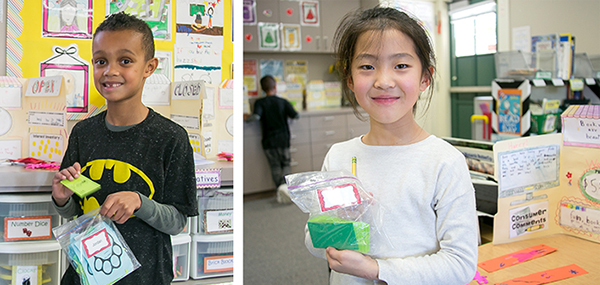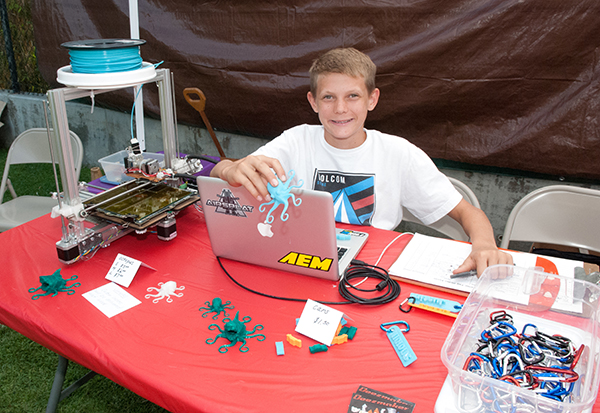1st Grade Classroom Store Teaches Economic Principles
Early entrepreneurship experiences are becoming increasingly important as an education tool to teach students a host of important lessons that can pay off later in life. According toinc.com editor Tom Foster, who wrote about student entrepreneurship programs in February 2017, “The big idea underpinning all of them: Work has changed, and no matter what career kids ultimately pursue, they’re going to have to constantly adapt and innovate in order to succeed–just like entrepreneurs do.”
There is no escape from learning what it means to be a consumer who is constantly shelling out money for purchases. But, everything changes when there is early exposure to the basics of business thinking. This can change a student’s entire outlook–especially when they can explore, in an age-appropriate way, how to generate valuable ideas, create products and services, and hopefully build wealth.
At Clairbourn School, these lessons can start as early as preschool where students can play “store” in the classroom or even “go big” by having their own booth at the Annual Entrepreneur Fair where they can sell goods and services to the school community. Then as they move through the higher grade levels at Clairbourn, the entrepreneur opportunities repeat and expand so they can continue to develop their skills, business thinking, and overall success.
Recently, Clairbourn’s first grade class, taught by Miss Lindsay Dezutter, held their own First Grade Classroom Store Activity as part of their social studies unit. This project was an introduction to economics, and it provided background knowledge to prepare students for future economics units and the 3rd Grade Marketplace project. Their class activity covered the economic concepts of consumers and producers, wants and needs, money exchanged for goods and services, and time and materials costs.
For this activity, students were asked to create individual shops that would sell goods they produced themselves. They only could use paper to make their products and everything had to be handmade. They also were required to set the price for their products.

Clairbourn first-graders participated in a Classroom Store Activity where they created their own store with handmade paper products. These two students made 3D paper characters to sell.
- Being a respectful and responsible citizen in the classroom
- Doing their classroom job everyday
- Turning in their homework on-time
- Turning in their poetry book on-time
- Turning in their library book on-time
- Bonus dollar for being the Secret Star Student of the day

Clairbourn students earned “dollars” to use at the First Grade Classroom Store event by practicing good classroom behaviors and habits. The students above are loaded with bags of cash to spend at the fair.
To prepare, the students got busy generating ideas, making their inventory of products, and designing their shop boards with product information and prices. When everything was ready for the big day, the First Grade Classroom Store event was filled with smiling faces and delightful creations for sale at a variety of “shops.” The students took turns being the sellers and consumers of products to ensure they were on both sides of the experience. The profits made at their Classroom Store shops were then kept on account to be used at later events.

Clairbourn first-graders made everything from cute paper pets, to bookmarks, artwork, paper airplanes, throwing stars and even origami objects.
It is important to note that big ideas can come from small-scale entrepreneur activities involving young children. The aforementioned article from inc.com, “These Nine Organizations Are Turning Kids Into Entrepreneurs,“ reported that “The biggest success to emerge from a fair so far is Me & the Bees Lemonade, a brand started in Austin eight years ago by then-4-year-old Mikaila Ulmer. She has national distribution in Whole Foods and Wegmans and scored a $60,000 investment from Daymond John on Shark Tank last year. “
Clairbourn School’s own Nick Myers, who graduated in 2016, is another success story, and he is still continuing the lucrative business he started at Clairbourn’s Entrepreneur Fair when he was in 7th Grade. According to journalist May Ruiz, who interviewed him in 2015 for the San Gabriel Sun Newspaper, “Nicholas, had a booth selling 3D printed luggage ID tags on a carabiner at $7 apiece. He had several pre-made tags but he also offered personalized ones created on site (he estimated that each would take about eight minutes to make) and tags were likewise available on order. Nick made about $1,000 on his first business venture. Of last year’s success, he enthused: “It felt good making kids smile by providing a product that I enjoy making on my 3D printer.”

Nick Myers, Class of 2016, has continued a 3D luggage tag business that he started as a seventh-grader at Clairbourn School’s 2015 Entrepreneur Fair.
Each day, students should be finding ways to develop their current and future value as citizens by applying their creativity, education, and hard work with the goal to contribute to the greater good. As well-known entrepreneur Jay Samit says, “Your innovation can create new winners and losers; or at the very least, make existing companies look fresh and innovative by partnering with you. Everyone wants to align with market makers.”

8400 Huntington Drive | San Gabriel, CA 91775 626.286.3108 | info@clairbourn.org
Private School Education for Preschool, Kindergarten, Elementary School & Middle School. Serving Families in the Pasadena Area and San Gabriel Valley. Clairbourn is a 501(c)3 charitable organization (K-12 Private Schools) and accredited by CAIS and WASC. Child Care Facility license # 191500903.

